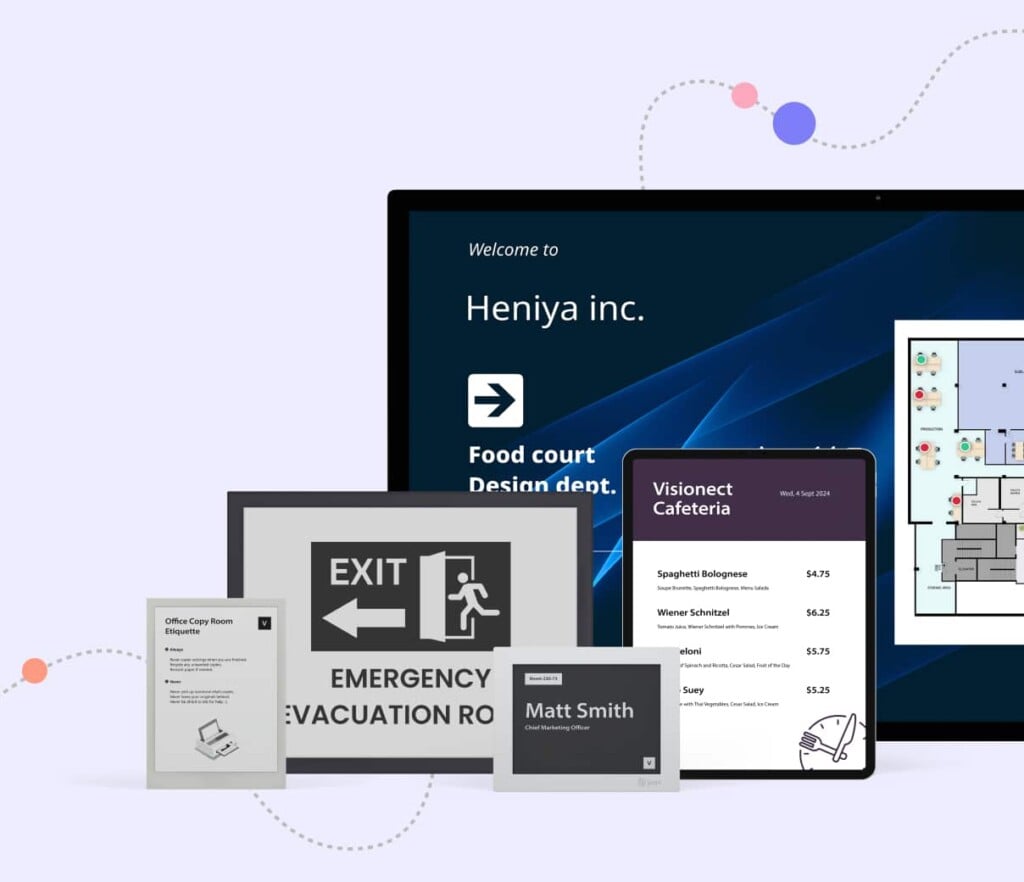Office desk booking software with ROI built in
The modern workplace presents a fascinating paradox. Walk into most offices on a Tuesday morning and you’ll find employees claiming available desks throughout the space, collaborating in hallways, and creating the productive energy that makes office culture thrive. Return to that same space on Friday afternoon and discover rows of empty workstations, silent meeting rooms, and enough vacant space to practice your presentation without disturbing anyone.
Companies pay for full-capacity real estate while actual utilization fluctuates dramatically throughout the week. Hybrid work environments and flexible workspace arrangements have made this challenge even more complex.
Office desk booking software eliminates morning desk searches and provides data-driven insights about actual space utilization while supporting activity-based working models.
Quickly jump to:
- What is office desk booking software
- The business case and ROI for office desk booking software
- What to look for in office desk booking software
- How to choose the right office desk booking software
- All-in-one workplace management solution
- Customer success story PwC Norway
- Give your people a better way to book desks
- FAQ about having office desk booking software
What is office desk booking software
Office desk booking software allows employees to reserve specific workstations in advance through visual floor plans and mobile apps. Unlike permanent desk assignments, the technology treats workspace as a shared resource that adapts to actual attendance patterns.
Modern office desk booking softwares support multiple workplace models including hot desking (first-come, first-served basis), desk hoteling (advance reservations), and assigned seating arrangements. These solutions integrate seamlessly with existing office management tools like Microsoft Teams, Slack, and Google Workspace to create an app-less booking experience.

The business case and ROI for office desk booking software
Did you know that organizations can save upwards of $300,000 annually through proper space optimization? Commercial real estate typically ranks as the second-highest expense for most organizations, exceeded only by employee salary.
You might think that office desk booking software is just another expense, but the ROI calculation reveals three areas where desk booking platforms deliver measurable returns that often exceed the software investment within months:
- Space cost savings. Calculate your current cost per desk by dividing annual real estate expenses by total workstations. Underutilized desks represent thousands in wasted capital. If office desk booking software allows you to reduce desk count by 20%, multiply that reduction by your per-desk cost. For example, eliminating 40 desks at $4,000 annual cost each saves $160,000 yearly.
- Productivity gains. Overcrowded environments diminish productivity by 15-30% per affected employee, while mismatched workspace types lower productivity by up to 25%. Office desk booking software eliminates daily desk searching time and ensures employees access appropriate workspaces for their tasks.
- Administrative efficiency. Booking software automates space management tasks while providing real-time data for better decision making. Most organizations see 20-30% reduction in space management overhead.
Simple ROI formula: (Annual space savings + Productivity gains + Administrative savings – Software cost) ÷ Software cost × 100 = ROI percentage
Most organizations achieve 200-400% ROI within the first year through space optimization alone.
Download our comprehensive workspace analytics guide to learn more about calculating your true occupancy costs, setting appropriate benchmarks, and optimizing your real estate investment through data-driven decision making.
What to look for in office desk booking software
The most effective office desk booking softwares share several critical capabilities that separate functional systems from transformative workplace tools:
User-friendly booking experiences
- Reserve workspaces from phones or laptops
- View visual floor plans showing exact desk locations
- Receive gentle reminders about upcoming reservations
- Flexible scheduling by hour, half-day, or full day
Team coordination tools
- See which teammates will be in the office
- Reserve adjacent spaces for collaborative work
- Neighborhood booking for teams working on shared projects
Smart space management
- Customizable floor plans that adjust as office layouts evolve
- Capacity management to prevent overcrowding
Integration capabilities
- Calendar synchronization with Outlook and Google Calendar
For a comprehensive evaluation framework, download our complete desk booking features checklist that covers all essential capabilities and helps organizations identify solutions that align with their specific hybrid work needs.

How to choose the right office desk booking software
Beyond essential features, successful office desk booking software implementation depends on selecting software that aligns with your organizational context.
- Test user experience first. Demo the software with employees who will use it daily. If booking takes more than three clicks, adoption will suffer. User-friendly design is crucial for scalability.
- Evaluate scalability. All-in-one desk booking platforms simplify vendor management while bringing together desk booking, meeting rooms, visitor check-ins, and other workplace needs in one system.
- Calculate total ownership costs. Factor in licensing, hardware, implementation, training, and ongoing support. The cheapest option often becomes expensive through poor adoption or limited functionality.
- Verify vendor reliability. Research customer testimonials, case studies, and online reviews from organizations similar to yours. Look for feedback about implementation support, ongoing reliability, and how quickly issues get resolved when they arise.
- Consider change management needs. Successful office desk booking software adoption requires proper change management strategies, especially when transitioning from assigned seating to hot desking or desk hoteling models.
All-in-one workplace management solution
Software with these essential features delivers three real benefits:
1. Saves money. Optimize your real estate investment through better office space utilization.
2. Reduces friction. Employees book desks easily without daily hunting or confusion through user-friendly mobile apps.
3. Provides control. Get workplace analytics and administrative oversight to make informed decisions about occupancy rates and workspace utilization.
Joan offers an all-in-one workplace management solution that includes desk booking, meeting room reservations, parking and assets management, visitor registration, and digital signage, eliminating the need for multiple vendors and systems.
Customer success story PwC Norway
PwC Norway successfully transitioned from traditional private offices to activity-based workspaces using Joan Desk booking system across nearly 300 workstations. Employees can book desks in advance or simply sit at available workspaces, with sensor technology automatically detecting presence and updating real-time availability.
Read our complete case study on how PwC Norway mastered activity-based working with Joan and Zens.

Give your people a better way to book desks
Office desk booking software delivers five transformational benefits:
- Creating a centralized booking platform that eliminates double bookings
- Automating administrative tasks to free up facility managers
- Providing flexible access controls for different teams
- Generating data-driven insights for space optimization
- Enhancing collaboration through coordinated scheduling
- Your organization is ready for office desk booking software if you have:
- Office attendance that varies significantly throughout the week
- Hybrid work policies with employees working remotely several days
- Plans for workforce growth or concerns about underutilized space
Joan provides the comprehensive office desk booking platform with user-friendly interfaces, mobile app accessibility, and seamless integration with existing workplace systems. Our solution supports both hot desking and desk hoteling models while providing real-time availability and workplace analytics.
Ready to experience stress-free workspace management? Try Joan Workplace completely free for 30 days with no credit card required
FAQs about having office desk booking software
What are the main benefits of office desk booking software?
Desk booking software delivers real cost savings through smarter space use. Companies routinely eliminate underused workstations and redirect those real estate dollars to growth initiatives.
More importantly, it solves the daily frustration of desk hunting. No more wandering around looking for a spot or settling for cramped corners. Employees get the workspace they need, when they need it. Facility managers stop playing referee and start focusing on what actually moves the business forward.
When should my organization implement desk booking software?
When office occupancy varies dramatically throughout the week, desk booking software becomes essential. If people work from home regularly and office attendance swings wildly throughout the week, traditional assigned seating stops making sense.
The tipping point is when employees complain about finding desks or you suspect you’re paying for empty space. If your team is growing but your office isn’t, booking software helps you do more with what you have.
How do I ensure employees actually use the desk booking software?
Keep it simple. If booking takes more than a few clicks, people won’t do it. Choose software that works with the tools they already use: their calendar, their phone, their existing workflow.
What are the best practices for implementing desk booking software?
Start with clear expectations, not rigid rules. People need to know how the system works without feeling micromanaged.
For the complete playbook on desk sharing etiquette, booking protocols, and handling peak demand, check out our guide. It covers everything from reservation windows to keeping workspaces clean.
How does desk booking software scale as our organization grows?
Look for platforms such as Joan Workplace that bundle everything: desk booking, meeting rooms, and visitor management, so you’re not juggling multiple vendors as you expand. The best systems give you better data as you grow, turning usage patterns into strategic insights about your real estate needs.
What’s the difference between Hot Desking, Desk Hoteling, and Flexible Workspaces?
Hot desking is first-come, first-served. Great for maximum flexibility, risky for guaranteed seating. You might spend your morning hunting for a desk.
Desk hoteling lets you reserve specific spots in advance. You know exactly where you’ll sit, can coordinate with teammates, and never worry about availability. Requires a bit more planning.
Flexible workspaces mix both approaches with some assigned seats, some bookable spots, and collaboration areas. It’s more complex to manage but easier for teams transitioning from traditional offices.